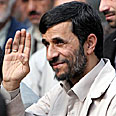
Iran processing new uranium batch
Facing U.N. Security Council referral, Iran confirms it started processing new batch of uranium at Isfahan nuclear plant, chief nuclear negotiator says
"We had informed the U.N. watchdog that Iran wanted to process a new batch of uranium and we have started it," the semi-official Mehr news agency quoted Larijani as saying.
Accused by Western nations of running a covert atomic weapons program, Iran had informed the International Atomic Energy Agency (IAEA) late in October that it planned to process a new batch of uranium without giving a specific date.
Larijani did not say when the processing began. A diplomat in Vienna first announced that work was underway on Wednesday.
With the next IAEA board meeting in November approaching, France, Britain and Germany trying to agree agreement with U.N Security Council permanent members on a response to Iran's decision to resume sensitive nuclear activities at a meeting in London on Friday.
Larijani reiterated that Iran would never give up its nuclear program, insisting that Tehran only wants the technology to generate electricity.
Iran is facing referral to the Security Council for possible sanctions after failing to convince the international community its nuclear ambitions are entirely peaceful.
But Larijani, the secretary of Iran's Supreme National Security Council, said he was optimistic about the outcome of the IAEA's November 24 meeting.
"I think the result of this meeting will be positive and favorable for Iran," said Larijani, who has written a letter to the so-called EU3, calling for the resumption of talks over Iran's atomic program.
Iran had suspended activities at Isfahan facility under a 2004 November deal with France Germany and Britain, the so-called EU3, but it resumed work at the plant in August, prompting the EU3 to suspend talks with Iran.
U.N.: Iran got nuclear info on black market
Meanwhile, the U.N. atomic monitoring agency said Friday that Iran obtained detailed instructions on how to set up the complicated process of enriching uranium, which can used to make nuclear arms, from the black market network run by a Pakistani scientist.
In a confidential report, the International Atomic Energy Agency also said Iran was not giving inspectors access to a sensitive site that could be used to store equipment indicating whether the military is running a secret nuclear program.
The five-page report seen by The Associated Press was prepared for Thursday's meeting of the IAEA's 35-nation board, which could decide to refer Tehran to the U.N. Security Council for possible sanctions for violating an international nuclear arms control treaty.
Most board nations are concerned that Iran has resumed uranium conversion — a precursor to enrichment — and has refused to meet all IAEA requests about a nuclear program that was clandestine for nearly 20 years until discovered three years ago.
The report said Iran had handed over documents revealing detailed instructions on setting up uranium enrichment that it obtained from the black market network of Abdul Qadeer Khan. The scientist, considered the father of Pakistan's nuclear program, has acknowledged selling secrets to Iran, Libya and North Korea.
The designs obtained from the black market show how to cast enriched, natural and depleted uranium metal into a spherical form, the agency said. Diplomats accredited to the agency said that could indicate a design for the core of a nuclear weapon.
Agency officials refused to comment on the implications of the finding. The report said Iran insisted it had not asked for the designs but was given them anyway by members of the nuclear network — something an official close to the agency said the IAEA was still investigating.










